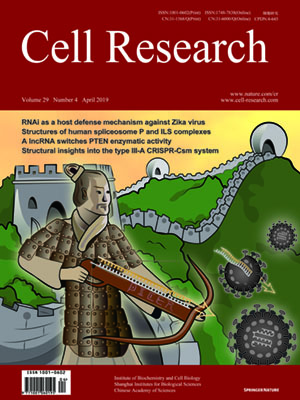
Volume 29, No 4, Apr 2019
ISSN: 1001-0602
EISSN: 1748-7838 2018
impact factor 17.848*
(Clarivate Analytics, 2019)
Volume 29 Issue 4, April 2019: 313-329
ORIGINAL ARTICLES
Vitamin B12 modulates Parkinson’s disease LRRK2 kinase activity through allosteric regulation and confers neuroprotection
Adam Schaffner 1,2 , Xianting Li1 , Yacob Gomez-Llorente2 , Emmanouela Leandrou3 , Anna Memou3 , Nicolina Clemente4 , Chen Yao5 ,Farinaz Afsari6 , Lianteng Zhi7 , Nina Pan1 , Keita Morohashi2 , Xiaoluan Hua 1,2 , Ming-Ming Zhou2 , Chunyu Wang4 , Hui Zhang7 ,Shu G. Chen5 , Christopher J. Elliott 6 , Hardy Rideout3 , Iban Ubarretxena-Belandia 2,8 and Zhenyu Yue 1
1 Department of Neurology and Neuroscience, Friedman Brain Institute, Icahn School of Medicine at Mount Sinai, New York, NY 10029, USA; 2Department of Pharmacological Sciences, Icahn School of Medicine at Mount Sinai, New York, NY 10029, USA; 3 Division of Basic Neurosciences, Biomedical Research Foundation of the Academy of Athens, Athens, Greece; 4 Department of Biological Sciences, Center for Biotechnology and Interdisciplinary Studies, Rensselaer Polytechnic Institute, Troy, NY 12180, USA; 5 Department of Pathology, Case Western Reserve University, Cleveland, OH 44106, USA; 6 Department of Biology, University of York, York YO1 5DD, UK; 7Department of Neuroscience, Thomas Jefferson University, Philadelphia, PA 19107, USA and 8 Biofisika Institute (CSIC, UPV/EHU), University of the Basque Country, Leioa, Spain
Correspondence: Zhenyu Yue (zhenyu.yue@mssm.edu)These authors contributed equally: Adam Schaffner, Xianting Li
Missense mutations in Leucine-Rich Repeat Kinase 2 (LRRK2) cause the majority of familial and some sporadic forms of Parkinson’s disease (PD). The hyperactivity of LRRK2 kinase induced by the pathogenic mutations underlies neurotoxicity, promoting the development of LRRK2 kinase inhibitors as therapeutics. Many potent and specific small-molecule LRRK2 inhibitors have been reported with promise. However, nearly all inhibitors are ATP competitive—some with unwanted side effects and unclear clinical outcome—alternative types of LRRK2 inhibitors are lacking. Herein we identify 5′-deoxyadenosylcobalamin (AdoCbl), a physiological form of the essential micronutrient vitamin B12 as a mixed-type allosteric inhibitor of LRRK2 kinase activity. Multiple assays show that AdoCbl directly binds LRRK2, leading to the alterations of protein conformation and ATP binding in LRRK2. STD-NMR analysis of a LRRK2 homologous kinase reveals the contact sites in AdoCbl that interface with the kinase domain. Furthermore, we provide evidence that AdoCbl modulates LRRK2 activity through disrupting LRRK2 dimerization. Treatment with AdoCbl inhibits LRRK2 kinase activity in cultured cells and brain tissue, and prevents neurotoxicity in cultured primary rodent neurons as well as in transgenic C. elegans and D. melanogaster expressing LRRK2 disease variants. Finally, AdoCbl alleviates deficits in dopamine release sustainability caused by LRRK2 disease variants in mouse models. Our study uncovers vitamin B12 as a novel class of LRRK2 kinase modulator with a distinct mechanism, which can be harnessed to develop new LRRK2-based PD therapeutics in the future.
https://doi.org/10.1038/s41422-019-0153-8
FULL TEXT | PDF
Browse 1635


